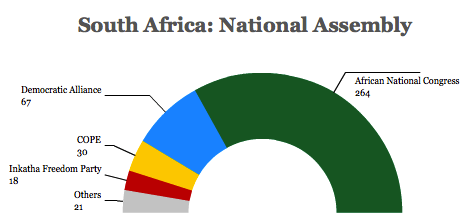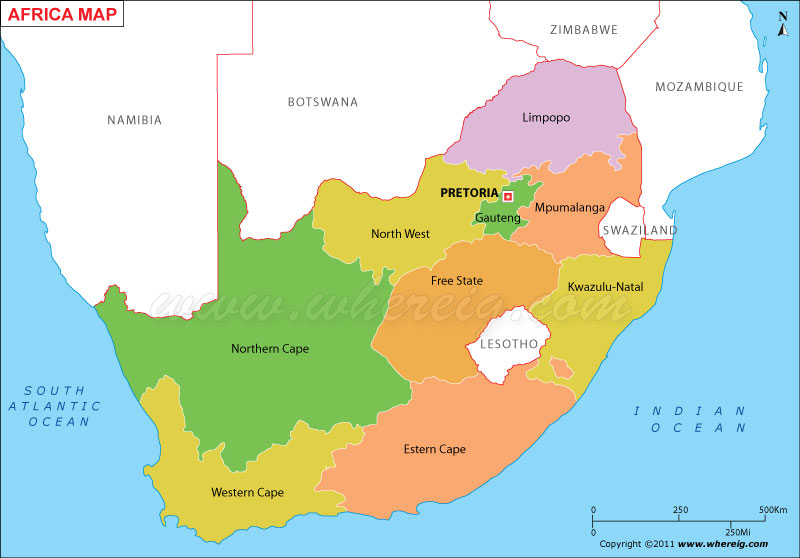South Africans go to the polls for the fifth time in the post-apartheid era today in a race that the ruling African National Congress (ANC), the liberation movement that forced the end of minority white rule in 1994, is nearly guaranteed to win.![]()
South Africans will elect all 400 members of the National Assembly, by proportional representation on a closed-list basis (which may explain, in part, the hierarchical party strength of ANC governance). They will also elect governments in South Africa’s nine provinces.
Here’s the current breakdown:
Notably, it’s the first election that will feature the ‘born-frees,’ the generation of South Africans who were born after the end of apartheid rule. Though they’re only 2.5% of the electorate today, they’ll become an increasingly vital demographic, and they might well change the face of South African politics over the next decade.
* * * * *
RELATED: Even with victory assured, is the ANC’s future at risk?
* * * * *
Jacob Zuma, the president since 2009, is leading the ANC campaign, despite his relative unpopularity as South Africans face dwindling economic growth, rising unemployment and the sense that the ANC is more interested in maintaining — and abusing — power than attending to the pressing policy concerns of most South Africans. Zuma’s spending on ‘security improvements’ to his home at Nkandla has captured the widespread disgust of much of the electorate. His government’s handling of a mining strike at Marikana two years ago ended with a clash with police that killed 44 people in the worst state-sponsored violence since the apartheid era. The fallout has severely strained the so-called tripartite alliance among the ANC, the Communist Party of South Africa and the Congress of South African Trade Union (COSATU).
* * * * *
RELATED: Zuma is strongest president on HIV/AIDS in South African history
* * * * *
Notwithstanding those concerns, the ANC is almost assured of victory, thanks to its role as the liberation movement that ended apartheid under the mythic leadership of former president Nelson Mandela, who died late last December. The biggest question is whether the ANC will achieve the support of at least two-thirds of the electorate — it could win just 60% (or even less) of the vote.
* * * * *
RELATED: How Nelson Mandela’s death provides South Africa a challenge and an opportunity
* * * * *
The chief opposition party, the Democratic Alliance (DA), seems set to increase its support to a historically high level, possibly more than 20% or even 25%.
Despite its reputation as a party of monied white South Africans, it’s increasingly worked to build a broader socioeconomic base of support. In the 2009 election, the party won control of Western Cape province, where a majority of the population is either coloured (the South African term for mixed-race) or white. Its leader, Helen Zille, herself a former mayor of Cape Town, an anti-apartheid activist and former journalist, has served as Western Cape premier for the past five years, and the DA is widely expected to retain control of that province. What’s more, the party hopes to make inroads in Eastern Cape province, and polls suggest it might win control of Northern Cape province as well.
The biggest potential prize, however, is Gauteng province, where the DA’s provincial party leader Mmusi Maimane is waging a strong campaign for the DA. Maimane, who is black, and who is a member of the Johannesburg city council, has tried to appeal to all classes and races in his campaign — he’s pledged to sort legal title for over 200,000 urban South Africans who informally own land within Soweto and some of the most poverty-ridden areas of Johannesburg, the country’s largest city. That means that the eyes of South African will be keenly watching the result in Gauteng, South Africa’s largest province, with 12.25 million people. If Maimane defeats the ANC machine, it will almost immediately elevate him into the most important opposition politician in South Africa, and it will provide the DA with a chance to show that it’s not just a rich white party.
* * * * *
RELATED: Who is Mmusi Maimane? Possibly the next premier of Gauteng.
* * * * *
Earlier this year, the DA tried to align with the well-known anti-apartheid leader Mamphela Ramphele, the widow of activist Steve Biko (who was killed by police in 1977) and a managing director of the World Bank between 2000 and 2004, to lead AgangSA, a new party formed last year (‘Agang’ means ‘to build’ in the Northern Sotho language). Ramphele initially agreed to serve as the DA’s presidential candidate in 2014, but the merger fell apart over questions of AgangSA’s future, and sharp criticism from the ANC that Ramphele was a ‘rented black face’ for the DA.
* * * * *
RELATED: Ramphele debacle leaves South African opposition reeling
* * * * *
The fight for third place seems likely to shine a light on Julius Malema, the former head of the ANC Youth League, who was banished from the ANC in 2012 after continually undermining Zuma and ANC policy — the final straw was a conviction for hate speech after he led a rousing version of an anti-apartheid anthem that includes the lyrics, ‘kill the Boer!’ Malema, a neo-Marxist who wears a red beret, promptly founded his own party, the Economic Freedom Fighters (EFF), promises to instate a Zimbabwe-style of land redistribution and nationalization if elected, in hopes of appealing to the masses of unemployed and most black South Africans who feel that the ANC has let them down in two decades.
The EFF could become the official opposition in Limpopo and North West Provinces, and it’s almost certain to outpoll Ramphele’s AgangSA, the Zulu-based Inkatha Freedom Party (an apartheid-era alternative to the ANC that once challenged the ANC’s dominance in KwaZulu-Natal province) and the Congress of the People (COPE), a breakaway faction from the ANC led by former defence minister Mosiuoa Lekota, that opposed Zuma’s leadership of the ANC — it’s currently the third-largest faction in the National Assemble, but polls suggest it will fade away in this year’s election.
* * * * *
RELATED: Who is Julius Malema?
* * * * *
Ultimately, whatever the results in today’s election, Zuma may soon find that his power is on the wane. The ANC will hold a leadership conference in late 2017 to determine the ‘Big Six’ positions, including the party president, who will become the frontrunner as the ANC presidential candidate in 2019.
Right now, the most discussed candidates include the party’s deputy leader (and presumably, the next vice president of South Africa) Cyril Ramaphosa, who returned to politics this year after more than a decade in business, following his loss to Thabo Mbeki, president between 1999 and 2008, for the ANC leadership. Zuma’s ex-wife, Nkosazana Dlamini-Zuma, who was married to the current president from 1982 to 1998, served as health minister from 1994 to 1999, as minister of foreign affairs from 1999 to 2009, then home minister from 2009 to 2012. Currently, she serves as chairperson of the African Union Commission, formerly the Organisation of African Unity.
Both Dlamini-Zuma and Ramaphosa, however, are from the same generation of ANC leadership as Mbeki and Zuma, and they hardly inspire the kind of freshness and dynamism of leaders that can govern South Africa through 2029. Younger leaders within the ANC, such as 42-year-old public enterprises minister Malusi Gigaba, the ANC’s campaign chief in 2014, and third on the ANC’s parliamentary election list behind Zuma and Ramaphosa, could leapfrog the older generation. Another minister with a strong record is health minister Aaron Motsoaledi, age 55, who has implemented a surging HIV/AIDS policy meant to catch up from years of delay and denialism by the Mbeki administration.


